Kristine Hughes's Blog, page 103
September 16, 2013
Please Join Us . . . An Invitation From Victoria
Victoria here. As you know by now, Kristine and I have planned a Wellington Tour to England in September, 2014 that we hope will appeal to all our blog readers, Facebook friends, fellow authors and Regency, Georgian and Victorian enthusiasts. We have included an attractive mix of places -- London, Brighton, Windsor...with the special, added attractions of Walmer Castle, Stratfield Saye, Basildon Park, Frogmore and Highclere Castle -- aka Downton Abbey -- all of which make us absolutely rabid to get underway.
We've managed to include a little bit of everything you love most about England -- wonderful parks, elegant interiors, seaside jaunts, historic landmarks, a river cruise, royal residences, centuries old pubs and lots of historical gossip. I've been to all these places -- with the exception of Highclere Castle. And I am so eager to go back to all of them, not to mention seeing the real Downton Abbey.
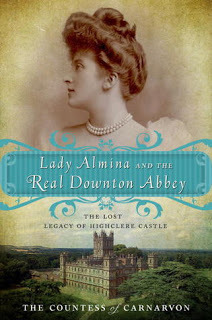
I read this fascinating book about Almina, Countess of Carnarvon, whose Rothschild fortune saved the 5th Earl and Highclere Castle and also financed his Egyptian expeditions. A selection of precious items from King Tut's Tomb will be part of our tour of Highclere Castle. And it's worth reading even more about Almina, who led a rather scandalous life after her husband died. So combine The Buccaneers, The Mummy's Curse, and Café Society between the Wars ...and multiply by 100. It's more fun than any of the capers of todays mindless starlets.
Furthermore, there is the garden and park at Highclere...which make only cameo appearances in DA.
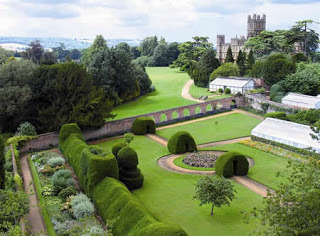
We've left lots of time for our group to be able soak up the atmosphere and grounds at Walmer Castle, the Brighton Pavilion, Stratfield Saye and Windsor Castle. Kristine is determined to leave flower bouquets at the graves of Wellington and his Waterloo mount, the fabulously bad tempered Copenhagen. We'll take you on pub crawls and strolls through the streets of London that are simply steeped in Regency through Victorian history - gentleman's clubs, the homes of period personalities, shops and Royal landmarks.
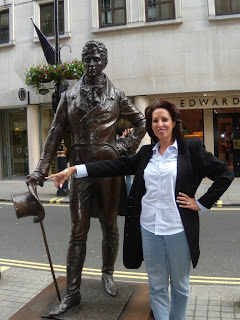 Kristine in Jermyn Street with our close friend, the Beau. We'll make plenty of time for you to have your photo taken with Brummell, as well.
Kristine in Jermyn Street with our close friend, the Beau. We'll make plenty of time for you to have your photo taken with Brummell, as well. 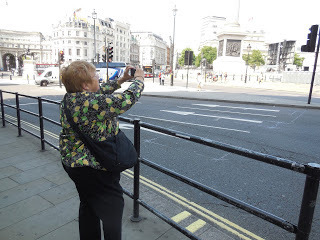 Victoria trying to photograph Apsley House, despite the London traffic.
Victoria trying to photograph Apsley House, despite the London traffic. In our excitement, Kristine and I have assembled a Pinterest board comprised of photos of the many places and items you'll see on The Wellington Tour. Please visit - Click here.
In our previous tours, Kristine and I have had lots of fun -- and excitement. We had an encounter with Highwaymen at Belvoir Castle - and I'm proud to tell you that we won!
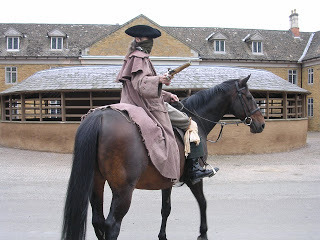 We accompanied the Duke of Wellington to Waterloo and inspected the tents of his soldiers. Really. In Belgium.
We accompanied the Duke of Wellington to Waterloo and inspected the tents of his soldiers. Really. In Belgium. 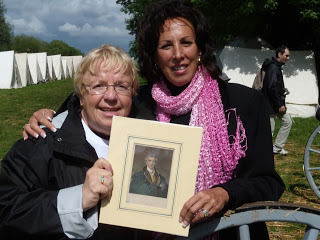 We've both passed Buckingham Palace many times, though we haven't had time for tea with Her Majesty yet. One of these days . . . . .
We've both passed Buckingham Palace many times, though we haven't had time for tea with Her Majesty yet. One of these days . . . . .
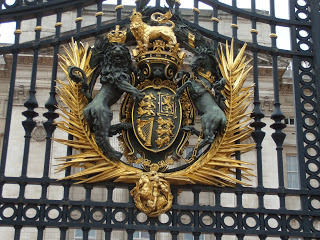
Of course, we've both made the pilgrimage to Apsley House every time we're in London. We can't wait to show you our favorite bits.
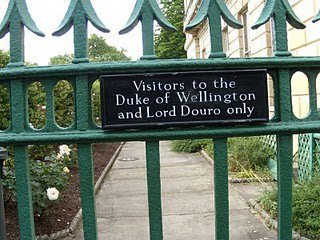
And while wandering down Pall Mall one day, we stood and wondered why these big torches burned all day. We've yet to find out. If you know, please leave a comment.
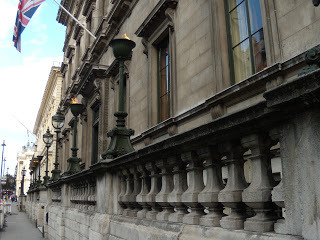 Royal Automobile Club, 89 Pall Mall There are hundreds of nooks and crannies at Windsor Castle we have yet to investigate. And we long to get another glimpse of the Playing Fields of Eton.
Royal Automobile Club, 89 Pall Mall There are hundreds of nooks and crannies at Windsor Castle we have yet to investigate. And we long to get another glimpse of the Playing Fields of Eton.
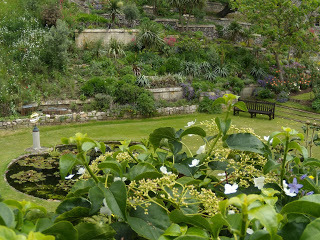 Windsor Castle Gardens in former moat And we have yet to meet the pelicans in St. James Park, those gigantic ones that never are around when we are.
Windsor Castle Gardens in former moat And we have yet to meet the pelicans in St. James Park, those gigantic ones that never are around when we are. 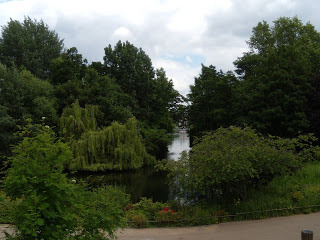 St. James Park
St. James ParkOr maybe we snoozed through their appearances.
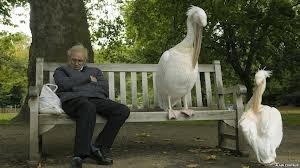 We have so much we're anxious to share with you and we hope that many of you can join us on this adventure - truly the trip of a lifetime. For Details on THE WELLINGTON TOUR, CLICK HERE.
We have so much we're anxious to share with you and we hope that many of you can join us on this adventure - truly the trip of a lifetime. For Details on THE WELLINGTON TOUR, CLICK HERE.FYI: What Kristine and Victoria really look like when they're in England.
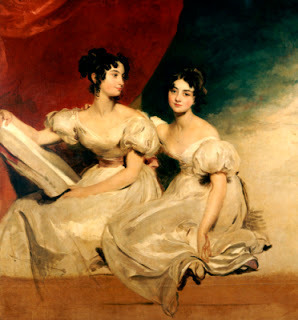 Funny how much we resemble The Fullerton Sisters, as painted by Sir Thomas Lawrence, c. 1825
Funny how much we resemble The Fullerton Sisters, as painted by Sir Thomas Lawrence, c. 1825
Published on September 16, 2013 00:00
September 13, 2013
Victoria's Day One in London, Part Four
Poor Ed, his foot unbelievably painful, decided to spend the afternoon at the hotel, nursing his wounds. I set off down Piccadilly just happy to be in London, listening to the noise of the traffic, the snatches of conversation in multiple languages from passers-by, and breathing the air, diesel fumes and all. I noted, however, that most of the buses are running on green fuels now, which should help. Just add the lorries, if you please.
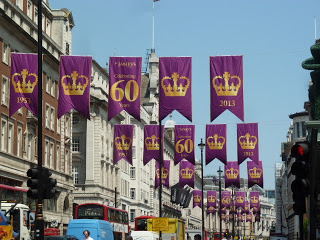 Piccadilly, celebrating the Diamond Jubilee of the Queen's 1953 Coronation I wandered along the street, stopping at a few favorite spots. Fortnum and Mason always is worth a visit, if only for the amusing displays, not to mention the delicious aromas.
Piccadilly, celebrating the Diamond Jubilee of the Queen's 1953 Coronation I wandered along the street, stopping at a few favorite spots. Fortnum and Mason always is worth a visit, if only for the amusing displays, not to mention the delicious aromas.
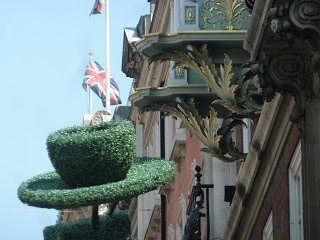 F and M Teacup
F and M Teacup
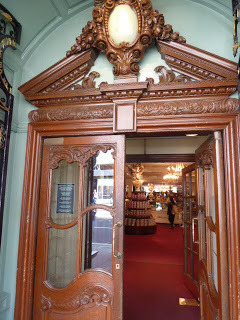 The Elegant Doorway of F and M
The Elegant Doorway of F and M
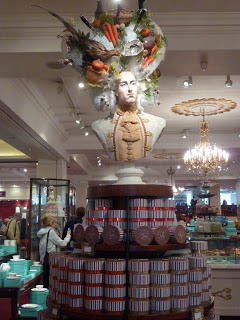 Displays in Fortnum and Mason I browsed around and tempted myself with possible purchases, but passed in favor of having manageable weights for my suitcase. Click here to order from home.
Displays in Fortnum and Mason I browsed around and tempted myself with possible purchases, but passed in favor of having manageable weights for my suitcase. Click here to order from home.
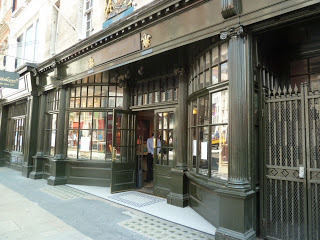 Hatchards, Piccadilly, Est. 1797 I admit I spent at least an hour or two in Hatchards, a place I adore. Visit by clicking here.
Hatchards, Piccadilly, Est. 1797 I admit I spent at least an hour or two in Hatchards, a place I adore. Visit by clicking here.
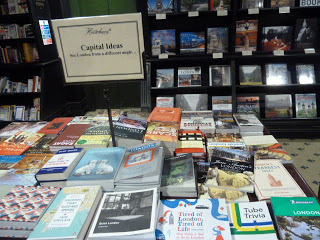 Capital Ideas Table, with Louise Allen's Walking Jane Austen's London I was very happy to find Regency author Louise Allen's new book Walking Jane Austen's London on sale. I bought it, but bypassed a few others...again considering the weight of my luggage. But browsing in a wonderful bookshop is always rewarding in itself.
Capital Ideas Table, with Louise Allen's Walking Jane Austen's London I was very happy to find Regency author Louise Allen's new book Walking Jane Austen's London on sale. I bought it, but bypassed a few others...again considering the weight of my luggage. But browsing in a wonderful bookshop is always rewarding in itself.
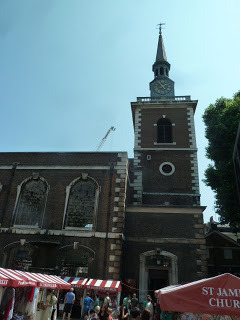 St. James and its marketplace More browsing here, a blend of small dealers in antiques and collectibles, books, and -- sorry to say -- junk. Or make that junque, since it comes from such a lovely spot. This little market is in the church courtyard almost every day...and there is a nice coffee shop as well. And seats. But then Ed and his sore foot were resting up at the hotel, I hoped. And my feet were itching for more adventures.
St. James and its marketplace More browsing here, a blend of small dealers in antiques and collectibles, books, and -- sorry to say -- junk. Or make that junque, since it comes from such a lovely spot. This little market is in the church courtyard almost every day...and there is a nice coffee shop as well. And seats. But then Ed and his sore foot were resting up at the hotel, I hoped. And my feet were itching for more adventures.
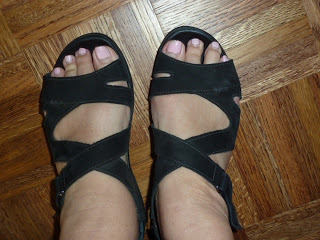 Ready and Willing; thank you, Mephisto! So I consulted a little list I'd made of places I wanted to see in London that had previously escaped my attention. Aha! The Foundling Museum. Why not? Ed would never want to see all those little treasures the mother's made to identify their babes if they could return someday. But it was something I'd always meant to see.
Ready and Willing; thank you, Mephisto! So I consulted a little list I'd made of places I wanted to see in London that had previously escaped my attention. Aha! The Foundling Museum. Why not? Ed would never want to see all those little treasures the mother's made to identify their babes if they could return someday. But it was something I'd always meant to see.
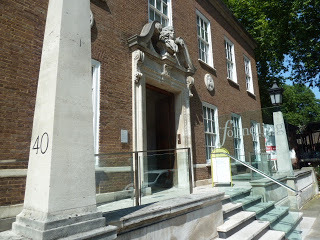 Foundling Museum A short tube ride brought me close to the Museum, which you can read about here. Below is the medallion showing three little angels, a symbol of the Foundling Hospital.
Foundling Museum A short tube ride brought me close to the Museum, which you can read about here. Below is the medallion showing three little angels, a symbol of the Foundling Hospital.
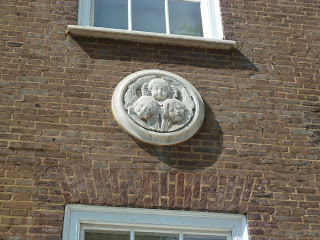 The Foundling Hospital was established by Thomas Coram (c.1688-1751), a wealthy merchant who spent a great deal of time in the American colonies where he had many business and governmental interests. In 1739, Coram secured a royal charter to build a home for the many abandoned children in the London streets.
The Foundling Hospital was established by Thomas Coram (c.1688-1751), a wealthy merchant who spent a great deal of time in the American colonies where he had many business and governmental interests. In 1739, Coram secured a royal charter to build a home for the many abandoned children in the London streets.
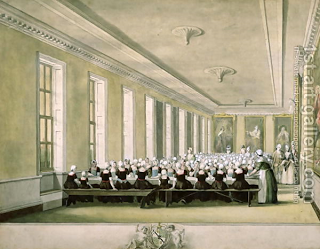 The Girl's Dining Room, 1773 Mothers often brought children they were unable to care for to the hospital and left tokens with them in the hope that someday they could be reunited. The tokens are often heart-breakingly simple, made from inexpensive materials but with a lot of love and hope.
The Girl's Dining Room, 1773 Mothers often brought children they were unable to care for to the hospital and left tokens with them in the hope that someday they could be reunited. The tokens are often heart-breakingly simple, made from inexpensive materials but with a lot of love and hope.
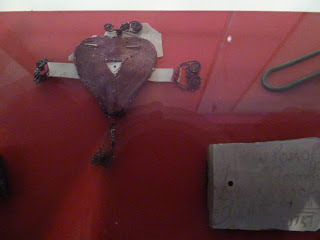
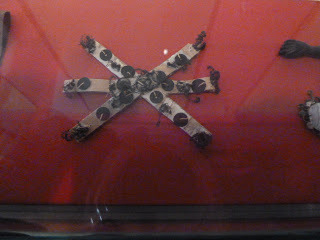 Many prominent artists and musicians were benefactors of the Foundling hospital, including William Hogarth (1697-1764)..
Many prominent artists and musicians were benefactors of the Foundling hospital, including William Hogarth (1697-1764)..
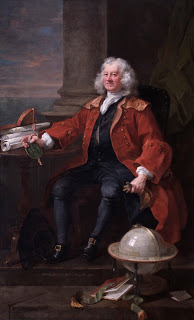 Thomas Coram, by William Hogarth, ©The Foundling Museum
Thomas Coram, by William Hogarth, ©The Foundling Museum
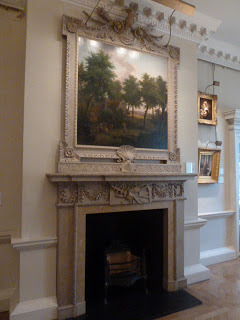 Painting above fireplace by George Lambert (1700-1765) The Foundling Museum is located in one of the original Hospital buildings and houses rooms used by the board members and other philanthropists. Opened in 2004, it cares for and exhibits the collection of the Foundling Hospital..
Painting above fireplace by George Lambert (1700-1765) The Foundling Museum is located in one of the original Hospital buildings and houses rooms used by the board members and other philanthropists. Opened in 2004, it cares for and exhibits the collection of the Foundling Hospital..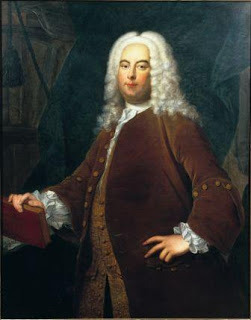 George Frideric Handel (1685-1759)school of Thomas HudsonThe Gerald Coke Handel Collection of Handel memorabilia can be seen and studied at the Foundling Museum as well. Handel's benefit concert of The Messiah in 1750 was the first of a series which brought the sum of £7,000 (equivalent today to about £500,000) to the Hospital. Handel left a score of the work to the Hospital. On the top floor of the museum, visitors can settle into comfortable chairs and listen to Handel's works -- and other musical selections -- on earphones.
George Frideric Handel (1685-1759)school of Thomas HudsonThe Gerald Coke Handel Collection of Handel memorabilia can be seen and studied at the Foundling Museum as well. Handel's benefit concert of The Messiah in 1750 was the first of a series which brought the sum of £7,000 (equivalent today to about £500,000) to the Hospital. Handel left a score of the work to the Hospital. On the top floor of the museum, visitors can settle into comfortable chairs and listen to Handel's works -- and other musical selections -- on earphones.
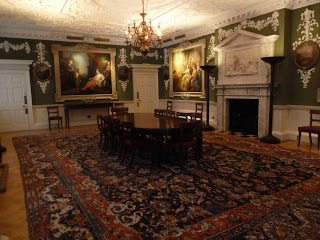 Rococo Court Room I felt a little guilty sitting in total comfort listening to magnificent music while Ed nursed his sore foot. Eventually, I walked back to the hotel and found him happily ensconced on the bed watching the BBC News Channel, his favorite if CNN is not available. He was almost ready for dinner. Next, a train trip to Cambridge
Rococo Court Room I felt a little guilty sitting in total comfort listening to magnificent music while Ed nursed his sore foot. Eventually, I walked back to the hotel and found him happily ensconced on the bed watching the BBC News Channel, his favorite if CNN is not available. He was almost ready for dinner. Next, a train trip to Cambridge
Published on September 13, 2013 05:29
September 11, 2013
Fashions from 1813
If you'd been living two hundred years ago, you might be spending part of the days of early autumn reading Jane Austen's Pride and Prejudice. And you might be wearing one of these ensembles, from Victoria's collection of Fashion Plates.
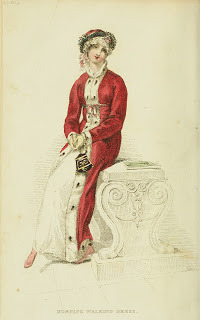 Ackermann's Repository, Jan. 1813 Morning Walking Dress:A round robe of Cambric muslin, with long full sleeves and simple short collar confined in the center of the throat with a stud or broach; the same fastening the dress at the wrist. A robe pelisse of bright morone velvet formed quite plain, simply meeting in the front, with rounded collar; trimmed entirely round with spotted ermine, and confined at the bottom of the waist with a ribband of corresponding shades tied in front.
Ackermann's Repository, Jan. 1813 Morning Walking Dress:A round robe of Cambric muslin, with long full sleeves and simple short collar confined in the center of the throat with a stud or broach; the same fastening the dress at the wrist. A robe pelisse of bright morone velvet formed quite plain, simply meeting in the front, with rounded collar; trimmed entirely round with spotted ermine, and confined at the bottom of the waist with a ribband of corresponding shades tied in front.
A Flora cap, ornamented with ribband and mall flower on the left side. A village hat of morone velvet, with open edge of black chenille; a flower similar to that which ornaments the cap, placed on the opposite side, and tied under the chin with the same ribband.Half- boots of morone velvet, or kid. Gloves of pale tan or amber kid. Ridicule of morone velvet, embroidered with gold.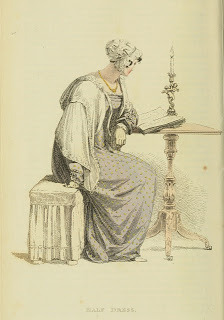 Ackermann's Repository, March 1813 Half-Dress: A round robe of coloured sarsnet, or muslin, spotted with amber; drawn frock bosom; and long, full sleeves tied twice at the wrist at regular distances. A tucker or lace, or plaited net.
Ackermann's Repository, March 1813 Half-Dress: A round robe of coloured sarsnet, or muslin, spotted with amber; drawn frock bosom; and long, full sleeves tied twice at the wrist at regular distances. A tucker or lace, or plaited net.
A cap a la Russe, composed of white satin and lace, confined with a ribband round the head, terminating in bows and ends on one side. Hair in dishevelled curls. Necklace and cross of amber beads. Gloves and shoes of lemon-coloured kid. Spanish capuchin, or lappelled cloak of white or stone-coloured kerseymere, embroidered with a rich border, in chenille and silk.
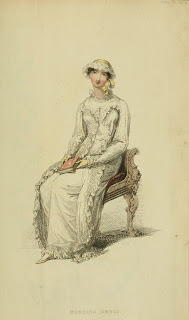 Ackermann's Repository, April 1813 Morning Dress:
Ackermann's Repository, April 1813 Morning Dress:
A Polonese robe and petticoat of fine cambric or jaconot muslin, ornamented at its several terminations with a border of net-work, furnished with an edging of muslin, gathered very full, and a vandyke cuff, en suite.A bonnet-cap, composed of jonquille satin, and treble borders of scollopped lace, confined on one side with ribband of the same colour. Gloves and slippers of yellow kid.This robe, so attractive, novel, and elegant, is more particularly adapted to the slender or tall figure; and is furnished us from the house of Mrs. Gill of Cork-street, Burlington Gardens, to whose unrivalled taste, unique elegance, and novelty of design, we have for some time past been indebted for the superior order of female fashions by which, we flatter ourselves, this publication is ever distinguished.
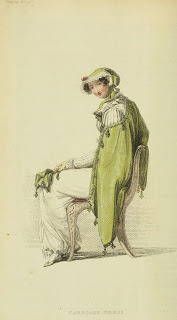 Ackermann's Repository April 1813 Carriage Dress A high round robe of jaconet or cambric muslin, with plaited bodice, long sleeve, and deep falling frill, terminated with a vandyke of needle work. A Russian mantle, of Pomona, or spring green sarsnet, lined with white satin, and trimmed with rich frog fringe and binding, confined with a cord and tassel, as taste or convenience may direct.
Ackermann's Repository April 1813 Carriage Dress A high round robe of jaconet or cambric muslin, with plaited bodice, long sleeve, and deep falling frill, terminated with a vandyke of needle work. A Russian mantle, of Pomona, or spring green sarsnet, lined with white satin, and trimmed with rich frog fringe and binding, confined with a cord and tassel, as taste or convenience may direct.
A cottage slouch bonnet, of corresponding materials, edged with antique scolloped lace, confined under the chin with ribbon, tied on the left side; and appositely ornamented with a small cluster o spring flowers Slippers of green kid, or jean, and gloves of primrose kid.
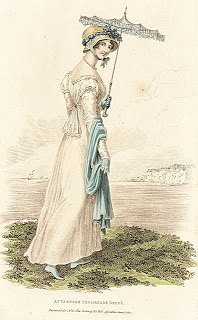 LaBelle Assemblee, June 1813 Afternoon Promenade Dress:
LaBelle Assemblee, June 1813 Afternoon Promenade Dress:
Short dress of jaconet muslin, made rather scantier in the skirt than they have been worn, and cut down as much as possible all around the bosom and back of the neck. The body is full, but drawn in at the top of the back, which is ornamented with a while silk button, and confined to the waist by a girdle of rich white figured ribband; a jacket of the same materials as the gown, fastened to the waist by a white silk button, complete this truly elegant dress which is unequalled for tasteful simplicity. Over this our fair pedestrians throw a sky-blue scarf.
Bonnet of white-willow shavings, ornamented with a flower and wreath of sky-blue, and tied under the chin with a ribband to correspond. Hair dressed in very loose curls on each side of the temple and divided very much in front. Gloves and sandals of sky-blue kid. Necklace and earrings of white cornelian. Johnston parasol. This elegant appendage to the walking costume, is also of sky-blue silk, and finished with a rich and deep fringe; it has very recently made its appearance, and is already a general favorite.
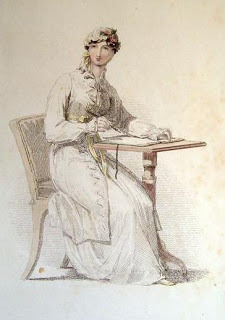 Ackermann’s Repository, August, 1813 Morning Dress A petticoat of jaconet or cambric muslin; with a Cossack coat, or three-quartered pelisse of lemon-coloured sarsnet, with vandyke Spanish border of a deeper shade. Full sleeves, confined at the wrist with a broad elastic gold bracelet; confined also, at the bottom of the waist, with a ribband en suite.Foundling cap of lace, with full double border in front, confined under the chin with a ribband the color of the pelisse, and tied on one side; a bunch of variegated carnations placed on the left side. Gloves and Roman slippers of lemon-coloured kid. Some descriptions courtesy of Susan Forgue's website: http://www.reg-ency.com/ user name: JAScholar password: Academia and Author Candice Hern's website: http://candicehern.com/ .
Ackermann’s Repository, August, 1813 Morning Dress A petticoat of jaconet or cambric muslin; with a Cossack coat, or three-quartered pelisse of lemon-coloured sarsnet, with vandyke Spanish border of a deeper shade. Full sleeves, confined at the wrist with a broad elastic gold bracelet; confined also, at the bottom of the waist, with a ribband en suite.Foundling cap of lace, with full double border in front, confined under the chin with a ribband the color of the pelisse, and tied on one side; a bunch of variegated carnations placed on the left side. Gloves and Roman slippers of lemon-coloured kid. Some descriptions courtesy of Susan Forgue's website: http://www.reg-ency.com/ user name: JAScholar password: Academia and Author Candice Hern's website: http://candicehern.com/ .
 Ackermann's Repository, Jan. 1813 Morning Walking Dress:A round robe of Cambric muslin, with long full sleeves and simple short collar confined in the center of the throat with a stud or broach; the same fastening the dress at the wrist. A robe pelisse of bright morone velvet formed quite plain, simply meeting in the front, with rounded collar; trimmed entirely round with spotted ermine, and confined at the bottom of the waist with a ribband of corresponding shades tied in front.
Ackermann's Repository, Jan. 1813 Morning Walking Dress:A round robe of Cambric muslin, with long full sleeves and simple short collar confined in the center of the throat with a stud or broach; the same fastening the dress at the wrist. A robe pelisse of bright morone velvet formed quite plain, simply meeting in the front, with rounded collar; trimmed entirely round with spotted ermine, and confined at the bottom of the waist with a ribband of corresponding shades tied in front.A Flora cap, ornamented with ribband and mall flower on the left side. A village hat of morone velvet, with open edge of black chenille; a flower similar to that which ornaments the cap, placed on the opposite side, and tied under the chin with the same ribband.Half- boots of morone velvet, or kid. Gloves of pale tan or amber kid. Ridicule of morone velvet, embroidered with gold.
 Ackermann's Repository, March 1813 Half-Dress: A round robe of coloured sarsnet, or muslin, spotted with amber; drawn frock bosom; and long, full sleeves tied twice at the wrist at regular distances. A tucker or lace, or plaited net.
Ackermann's Repository, March 1813 Half-Dress: A round robe of coloured sarsnet, or muslin, spotted with amber; drawn frock bosom; and long, full sleeves tied twice at the wrist at regular distances. A tucker or lace, or plaited net.A cap a la Russe, composed of white satin and lace, confined with a ribband round the head, terminating in bows and ends on one side. Hair in dishevelled curls. Necklace and cross of amber beads. Gloves and shoes of lemon-coloured kid. Spanish capuchin, or lappelled cloak of white or stone-coloured kerseymere, embroidered with a rich border, in chenille and silk.
 Ackermann's Repository, April 1813 Morning Dress:
Ackermann's Repository, April 1813 Morning Dress:A Polonese robe and petticoat of fine cambric or jaconot muslin, ornamented at its several terminations with a border of net-work, furnished with an edging of muslin, gathered very full, and a vandyke cuff, en suite.A bonnet-cap, composed of jonquille satin, and treble borders of scollopped lace, confined on one side with ribband of the same colour. Gloves and slippers of yellow kid.This robe, so attractive, novel, and elegant, is more particularly adapted to the slender or tall figure; and is furnished us from the house of Mrs. Gill of Cork-street, Burlington Gardens, to whose unrivalled taste, unique elegance, and novelty of design, we have for some time past been indebted for the superior order of female fashions by which, we flatter ourselves, this publication is ever distinguished.
 Ackermann's Repository April 1813 Carriage Dress A high round robe of jaconet or cambric muslin, with plaited bodice, long sleeve, and deep falling frill, terminated with a vandyke of needle work. A Russian mantle, of Pomona, or spring green sarsnet, lined with white satin, and trimmed with rich frog fringe and binding, confined with a cord and tassel, as taste or convenience may direct.
Ackermann's Repository April 1813 Carriage Dress A high round robe of jaconet or cambric muslin, with plaited bodice, long sleeve, and deep falling frill, terminated with a vandyke of needle work. A Russian mantle, of Pomona, or spring green sarsnet, lined with white satin, and trimmed with rich frog fringe and binding, confined with a cord and tassel, as taste or convenience may direct.A cottage slouch bonnet, of corresponding materials, edged with antique scolloped lace, confined under the chin with ribbon, tied on the left side; and appositely ornamented with a small cluster o spring flowers Slippers of green kid, or jean, and gloves of primrose kid.
 LaBelle Assemblee, June 1813 Afternoon Promenade Dress:
LaBelle Assemblee, June 1813 Afternoon Promenade Dress:Short dress of jaconet muslin, made rather scantier in the skirt than they have been worn, and cut down as much as possible all around the bosom and back of the neck. The body is full, but drawn in at the top of the back, which is ornamented with a while silk button, and confined to the waist by a girdle of rich white figured ribband; a jacket of the same materials as the gown, fastened to the waist by a white silk button, complete this truly elegant dress which is unequalled for tasteful simplicity. Over this our fair pedestrians throw a sky-blue scarf.
Bonnet of white-willow shavings, ornamented with a flower and wreath of sky-blue, and tied under the chin with a ribband to correspond. Hair dressed in very loose curls on each side of the temple and divided very much in front. Gloves and sandals of sky-blue kid. Necklace and earrings of white cornelian. Johnston parasol. This elegant appendage to the walking costume, is also of sky-blue silk, and finished with a rich and deep fringe; it has very recently made its appearance, and is already a general favorite.
 Ackermann’s Repository, August, 1813 Morning Dress A petticoat of jaconet or cambric muslin; with a Cossack coat, or three-quartered pelisse of lemon-coloured sarsnet, with vandyke Spanish border of a deeper shade. Full sleeves, confined at the wrist with a broad elastic gold bracelet; confined also, at the bottom of the waist, with a ribband en suite.Foundling cap of lace, with full double border in front, confined under the chin with a ribband the color of the pelisse, and tied on one side; a bunch of variegated carnations placed on the left side. Gloves and Roman slippers of lemon-coloured kid. Some descriptions courtesy of Susan Forgue's website: http://www.reg-ency.com/ user name: JAScholar password: Academia and Author Candice Hern's website: http://candicehern.com/ .
Ackermann’s Repository, August, 1813 Morning Dress A petticoat of jaconet or cambric muslin; with a Cossack coat, or three-quartered pelisse of lemon-coloured sarsnet, with vandyke Spanish border of a deeper shade. Full sleeves, confined at the wrist with a broad elastic gold bracelet; confined also, at the bottom of the waist, with a ribband en suite.Foundling cap of lace, with full double border in front, confined under the chin with a ribband the color of the pelisse, and tied on one side; a bunch of variegated carnations placed on the left side. Gloves and Roman slippers of lemon-coloured kid. Some descriptions courtesy of Susan Forgue's website: http://www.reg-ency.com/ user name: JAScholar password: Academia and Author Candice Hern's website: http://candicehern.com/ .
Published on September 11, 2013 00:30
September 9, 2013
Kristine and Victoria Plan A Trip To England
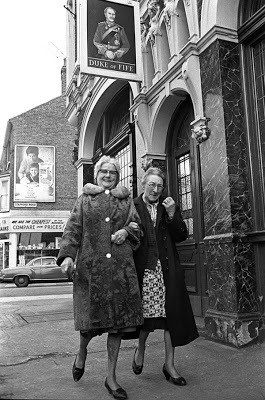
"We need to start planning our next trip to England together."
"Yeah, but we'd need an excuse for the husbands. I mean I just went, and you just went. How could we justify another trip? Without them?" Victoria asked.
"Well, I think I'm fine on that point. Hubby's had enough of England for the time being, my good man."
Victoria and I were together, seated on the patio at Panera Bread in Ft. Myers, Florida. We stared at one another across the table for a bit, our minds getting a Lucy and Ethel type workout.
"Think!" I urged as I lit a cigarette.
"I am thinking," Victoria assured me.
"Maybe we need alcohol."
Victoria checked her watch. "It's only 10: 30 a.m. Too early even for us."
Sigh. Think, think, think, think I admonished myself . . . . . . an idea suddenly occurred to me. I grinned. "By Jove, I think I've got it!"
"What? What!?"
"The blog."
"The blog?"
"Our blog. Number One London."
"Yeah, I know what our blog is called. What about it?" Victoria asked.
"A Number One London tour to England."
"A tour? With other people? Besides us?"
"Yes, Ethel, other people besides us. You know I worked as a tour guide for Patty Suchy and her Novel Explorations. You were on some of the tours I did."
"I know, but . . . I've never been a tour guide."
"But you've been to England hundreds of times. You're qualified. I'll get you a Blue Badge for Christmas. With your name on it and everything. Now come on, we have to come up with a theme for the tour. What would be a good theme?" Victoria and I threw out a couple of (lame) ideas for a tour theme. The best of the lot was Victoria's suggestion - Great Ladies of British History.
We kicked the idea around for a while.
"I'm not thrilled," I finally said.
"You'd think that you and I could come up with something better than that."
"You'd think."
Some minutes went by and we wracked our brains for inspiration. "This is becoming painful," Victoria said after a time.
"Are we stupid?" I asked Victoria.
"Apparently so."
"I mean you and I are really bloody stupid."
"I've already agreed with you. You don't have to rub it in."
"No, listen, I mean the theme of the first ever Number One London tour to England is so obvious."
"It is?"
"You ready?"
"For God's sake . . . . . "
"Wellington. As in the Duke of. As in the guy at the top of our blog. That Wellington."
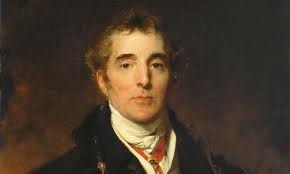 Victoria let out a whoop and clapped her hands. "Yes! It has to be Wellington. Obviously." Excitement gripped us both as we hurriedly drew paper and pens to ourselves. "Now we have to come up with an itinerary," I said. "We could do Spain and Portugal and then finish up in England." I blinked. "You forgot India. Look, we have to think about this realistically. We can't make the tour so inclusive that it becomes cost prohibitive." "You're right," Victoria conceded. "And we have to bear in mind that most people can't get away for a month at a time." "There is that," I agreed. "So we stick with England, agreed?" For the next hour, Victoria and I were like kids in a candy store. Once we had a theme we could sink our teeth into, we had no difficulty in fashioning a rough itinerary that included all the locations relevant to Wellington's life - London, Walmer, Brighton, Reading . . . . . . "What about that guy the Duke and his friends were always visiting?" I asked Victoria. "What guy?" "You know, the Duke of something. He had that stately home where they all went shooting and spent the holidays every year." I began running down dukes in my mind. Atholl? No. Bedford? Nyet. Norfolk? Sigh. "Rutland!" I cried at last. "The Duke of Rutland! What's the name of his house?" "Belvoir Castle," Victoria said without hesitation. "Where is it, exactly?" I asked her. "It's in Grantham, in Leicestershire, but I don't want to go back there." "You've already been there?" I asked, disappointed. Victoria gave me a pitying look. "You've been there, too. On the Great North Road tour you did with Patty. We were together. Your daughter Brooke was also there. It's where we were held up by the highwaymen." (Read about it here)
Victoria let out a whoop and clapped her hands. "Yes! It has to be Wellington. Obviously." Excitement gripped us both as we hurriedly drew paper and pens to ourselves. "Now we have to come up with an itinerary," I said. "We could do Spain and Portugal and then finish up in England." I blinked. "You forgot India. Look, we have to think about this realistically. We can't make the tour so inclusive that it becomes cost prohibitive." "You're right," Victoria conceded. "And we have to bear in mind that most people can't get away for a month at a time." "There is that," I agreed. "So we stick with England, agreed?" For the next hour, Victoria and I were like kids in a candy store. Once we had a theme we could sink our teeth into, we had no difficulty in fashioning a rough itinerary that included all the locations relevant to Wellington's life - London, Walmer, Brighton, Reading . . . . . . "What about that guy the Duke and his friends were always visiting?" I asked Victoria. "What guy?" "You know, the Duke of something. He had that stately home where they all went shooting and spent the holidays every year." I began running down dukes in my mind. Atholl? No. Bedford? Nyet. Norfolk? Sigh. "Rutland!" I cried at last. "The Duke of Rutland! What's the name of his house?" "Belvoir Castle," Victoria said without hesitation. "Where is it, exactly?" I asked her. "It's in Grantham, in Leicestershire, but I don't want to go back there." "You've already been there?" I asked, disappointed. Victoria gave me a pitying look. "You've been there, too. On the Great North Road tour you did with Patty. We were together. Your daughter Brooke was also there. It's where we were held up by the highwaymen." (Read about it here)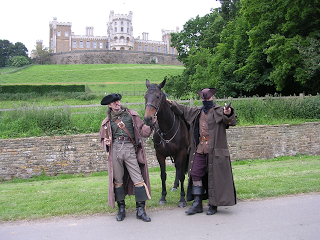 "Oh, yeah." Often the tours run together in my mind and I'm not sure where I've been. Or what I've seen. Or who I was with. "It's too far for a side trip, anyway. But speaking of Grantham . . . . " Victoria said slyly. "What about Grantham?" I asked. "Where does Lord Grantham live?" "At Downton Abbey?" "And what's Downton Abbey when it's at home?" Victoria encouraged. "Highclere Castle?" "Bingo! And where's Highclere Castle?"
"Oh, yeah." Often the tours run together in my mind and I'm not sure where I've been. Or what I've seen. Or who I was with. "It's too far for a side trip, anyway. But speaking of Grantham . . . . " Victoria said slyly. "What about Grantham?" I asked. "Where does Lord Grantham live?" "At Downton Abbey?" "And what's Downton Abbey when it's at home?" Victoria encouraged. "Highclere Castle?" "Bingo! And where's Highclere Castle?"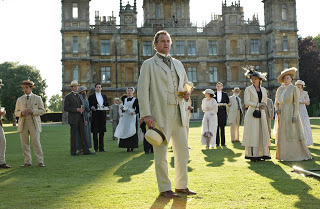 "I have no idea, but if you tell me I've already been there and don't remember it, I'll cry." "As far as I know, you haven't been there. And it's only down the road from Stratfield Saye." "Really?" "Well, I don't know if it's literally down the road, but it's close enough that we'd be foolish to pass it by. What do you know about Lord Carnarvon and the Duke of Wellington?" I was silent for a few minutes, mulling over Lord Carnarvon in my mind. "I got nothing," I said in the end. "Come to think of it, I don't think Lord Carnarvon's name has ever come up in relation to Artie. In fact, I'd say there is no connection." "We need a connection in order to justify it as a stop on the Wellington Tour," Victoria said. "No we don't." "We don't?" "No! It's our tour. We're planning the itinerary, right? We can put whatever we want on the schedule." Victoria looked skeptical. "If anyone questions it," I told her, "we'll just tell them we're going because we both want to see the room where Mr. Pamuk died. And because it's just down the road from Stratfield Saye. And Windsor." "Windsor's not down the road from Stratfield Saye." "No, I meant we need to add Windsor to the itinerary." And so we did. Finally, wrung out and exhausted, Victoria and I sat back and grinned at one another. "The itinerary isn't half bad," I said.
"I have no idea, but if you tell me I've already been there and don't remember it, I'll cry." "As far as I know, you haven't been there. And it's only down the road from Stratfield Saye." "Really?" "Well, I don't know if it's literally down the road, but it's close enough that we'd be foolish to pass it by. What do you know about Lord Carnarvon and the Duke of Wellington?" I was silent for a few minutes, mulling over Lord Carnarvon in my mind. "I got nothing," I said in the end. "Come to think of it, I don't think Lord Carnarvon's name has ever come up in relation to Artie. In fact, I'd say there is no connection." "We need a connection in order to justify it as a stop on the Wellington Tour," Victoria said. "No we don't." "We don't?" "No! It's our tour. We're planning the itinerary, right? We can put whatever we want on the schedule." Victoria looked skeptical. "If anyone questions it," I told her, "we'll just tell them we're going because we both want to see the room where Mr. Pamuk died. And because it's just down the road from Stratfield Saye. And Windsor." "Windsor's not down the road from Stratfield Saye." "No, I meant we need to add Windsor to the itinerary." And so we did. Finally, wrung out and exhausted, Victoria and I sat back and grinned at one another. "The itinerary isn't half bad," I said."Not half bad?" Victoria sneered. "Listen, if this wasn't our tour, I'd be signing up for it."
"How much fun is this going to be? This is going to be even better than our trip to Belgium for the re-enactment of the Battle of Waterloo."
Victoria grinned at me and offered up a phrase of the Duke of Wellington's that we often re-use, "You may depend upon it, Madam!"
JOIN KRISTINE AND VICTORIA IN LONDON ON SEPTEMBER 4, 2014 ANDTRAVEL WITH US ON AN EXCITING ITINERARY THROUGH ENGLAND. Available for booking as of today! FOLLOW THIS LINK FOR COMPLETE DETAILS ON THE WELLINGTON TOUR
Published on September 09, 2013 00:00
September 6, 2013
Victoria's Day One in London, Part Three
After our visit to Horse Guards and watching its ceremonies, I was eager to visit the antique dealer Mallett in Ely House in Mayfair. This is the location of their London showrooms, featuring an exhibition "The Age of Elegance". My every expectation was exceeded by this outstanding collection of objects from an 18th c. townhouse, displayed in the magnificence of Ely House, built for the Bishop of Ely in 1770, and now the site of the Mallett London showrooms.
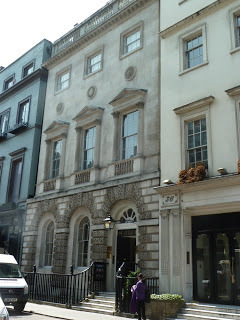 Mallett, 37 Dover Street, Mayfair
Mallett, 37 Dover Street, Mayfair
Ed enjoyed it too -- at least he said he did, though I could see him calculating if he dared to sit on one of the delicate antique chairs. He didn't, though we did find him a seat after a while. We were escorted by Ms Gina Hamilton, who was gracious enough to show us around. We had tried to clean off our dusty shoes at the doorstep, but I suspect she did not view us as prospective clients.
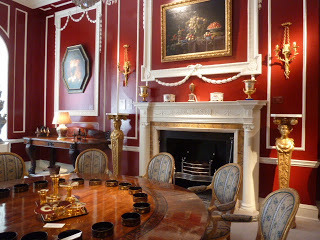 The Saloon Everything was for sale, and again, I so wished I had won the lottery. And pledged to buy a ticket the next time it got up to hundreds of millions. (Note: I haven't yet!)
The Saloon Everything was for sale, and again, I so wished I had won the lottery. And pledged to buy a ticket the next time it got up to hundreds of millions. (Note: I haven't yet!)
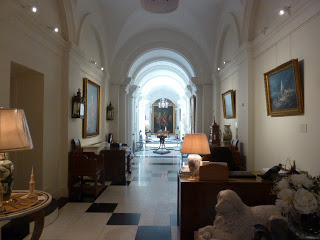 The interior is beautifully lit by large windows on the staircase.
The interior is beautifully lit by large windows on the staircase.
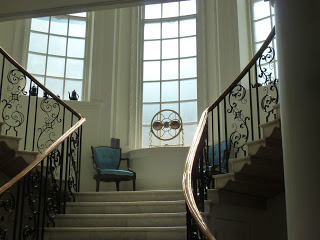
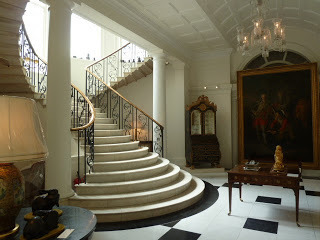 Two views of the graceful staircase.
Two views of the graceful staircase.
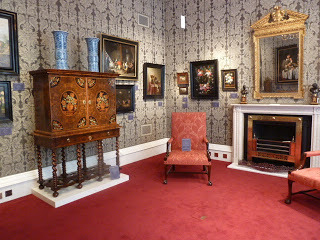 The Venetian Room
The Venetian Room
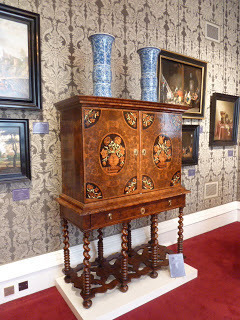 William And Mary Cabinet Above is a Cabinet of Oyster Veneer and Floral Marquetry on a stand, English, ca. 1690.
William And Mary Cabinet Above is a Cabinet of Oyster Veneer and Floral Marquetry on a stand, English, ca. 1690.
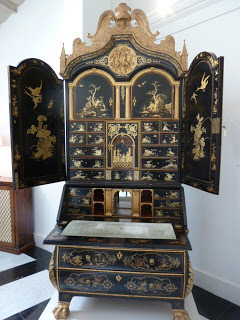 Japanned Bureau-Cabinet Early 18th c., black and gilt, from Germany
Japanned Bureau-Cabinet Early 18th c., black and gilt, from Germany
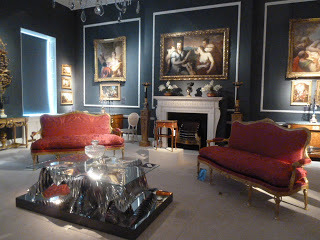 The Grey Room A feast for the eye, indeed. You can have hours of enjoyment by surfing the website of Mallett both in London and New York. Saying a heartfelt thank-you and a reluctant good-bye to Ms. Hamilton, we departed. "Time for lunch," Ed noted "I have just the place," I said quickly. "And it's only a short walk." At least, I hoped it would be a short walk -- and it was, to the restaurant Kristine and Greg enjoyed a few months before, Burger and Lobster.
The Grey Room A feast for the eye, indeed. You can have hours of enjoyment by surfing the website of Mallett both in London and New York. Saying a heartfelt thank-you and a reluctant good-bye to Ms. Hamilton, we departed. "Time for lunch," Ed noted "I have just the place," I said quickly. "And it's only a short walk." At least, I hoped it would be a short walk -- and it was, to the restaurant Kristine and Greg enjoyed a few months before, Burger and Lobster.
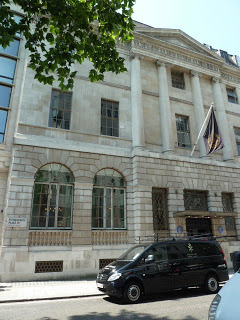 The Lansdowne Club On the way, we passed the Lansdowne Club, in the part of Lansdowne House that remained after the building was partially demolished in the early 1930's to put through Fitzmaurice Street, connecting Curzon Street with Berkeley Square. Read more about the club and the history of the building here.
The Lansdowne Club On the way, we passed the Lansdowne Club, in the part of Lansdowne House that remained after the building was partially demolished in the early 1930's to put through Fitzmaurice Street, connecting Curzon Street with Berkeley Square. Read more about the club and the history of the building here.
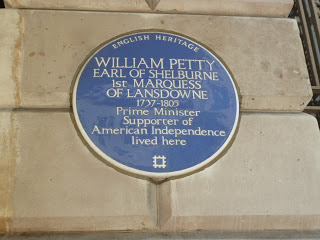 Agreements which ended the American Revolution were made on the premises.
Agreements which ended the American Revolution were made on the premises.
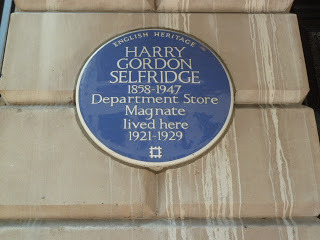 Gordon Selfridge lived here in the 1920's. If you are a watcher of Mr. Selfridge on PBS, in future episodes I suspect he will move to Lansdowne House where he held famous (infamous?) parties. Ever heard of the Dolly Sisters?
Gordon Selfridge lived here in the 1920's. If you are a watcher of Mr. Selfridge on PBS, in future episodes I suspect he will move to Lansdowne House where he held famous (infamous?) parties. Ever heard of the Dolly Sisters?
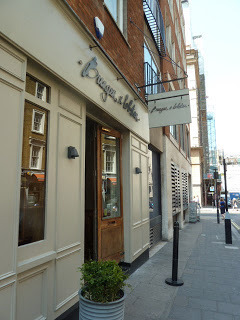 Burger and Lobster, 29 Clarges Street, Mayfair
Burger and Lobster, 29 Clarges Street, Mayfair
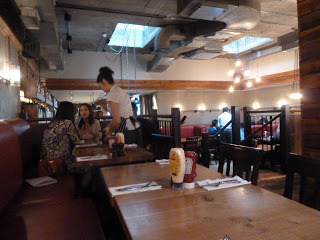 Our table awaits The restaurant was crowded and the food delicious. Ed was again delighted to be off his feet and able to take refreshment. Gin, as I recall. The décor is very avant, and reminded me of the latest trendy restaurant at home -- skylights, lots of clear lightbulbs on long cords, draped into groups, solid, simple furniture. The burgers were thick and juicy, the lobster delicate and tasty. We both loved it, but eventually we had to surrender our comfy spot to the waiting hordes.. As always, when wandering Mayfair, many of the buildings had blue plaques noting former residents.
Our table awaits The restaurant was crowded and the food delicious. Ed was again delighted to be off his feet and able to take refreshment. Gin, as I recall. The décor is very avant, and reminded me of the latest trendy restaurant at home -- skylights, lots of clear lightbulbs on long cords, draped into groups, solid, simple furniture. The burgers were thick and juicy, the lobster delicate and tasty. We both loved it, but eventually we had to surrender our comfy spot to the waiting hordes.. As always, when wandering Mayfair, many of the buildings had blue plaques noting former residents.
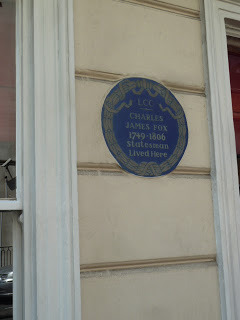 46 Clarges Street was once the home of Charles James Fox, the ultimate Whig and the bane of many a Tory. Appropriately, it is now the home of The Fox Club.
46 Clarges Street was once the home of Charles James Fox, the ultimate Whig and the bane of many a Tory. Appropriately, it is now the home of The Fox Club.
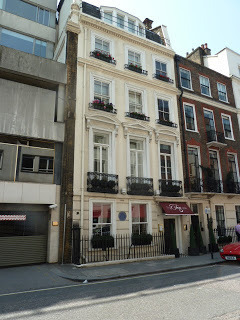 The Fox Club After another visit to Boots Pharmacy, Ed headed to Green Park Station to catch a Victoria tube back to St. Pancras. He could spend the remainder of the afternoon in the hotel soaking his foot and napping. As for me, I had an Agenda!!! After all, I was in LONDON!!! Details coming soon.
The Fox Club After another visit to Boots Pharmacy, Ed headed to Green Park Station to catch a Victoria tube back to St. Pancras. He could spend the remainder of the afternoon in the hotel soaking his foot and napping. As for me, I had an Agenda!!! After all, I was in LONDON!!! Details coming soon.
 Mallett, 37 Dover Street, Mayfair
Mallett, 37 Dover Street, MayfairEd enjoyed it too -- at least he said he did, though I could see him calculating if he dared to sit on one of the delicate antique chairs. He didn't, though we did find him a seat after a while. We were escorted by Ms Gina Hamilton, who was gracious enough to show us around. We had tried to clean off our dusty shoes at the doorstep, but I suspect she did not view us as prospective clients.
 The Saloon Everything was for sale, and again, I so wished I had won the lottery. And pledged to buy a ticket the next time it got up to hundreds of millions. (Note: I haven't yet!)
The Saloon Everything was for sale, and again, I so wished I had won the lottery. And pledged to buy a ticket the next time it got up to hundreds of millions. (Note: I haven't yet!)
 The interior is beautifully lit by large windows on the staircase.
The interior is beautifully lit by large windows on the staircase.

 Two views of the graceful staircase.
Two views of the graceful staircase.  The Venetian Room
The Venetian Room
 William And Mary Cabinet Above is a Cabinet of Oyster Veneer and Floral Marquetry on a stand, English, ca. 1690.
William And Mary Cabinet Above is a Cabinet of Oyster Veneer and Floral Marquetry on a stand, English, ca. 1690.
 Japanned Bureau-Cabinet Early 18th c., black and gilt, from Germany
Japanned Bureau-Cabinet Early 18th c., black and gilt, from Germany
 The Grey Room A feast for the eye, indeed. You can have hours of enjoyment by surfing the website of Mallett both in London and New York. Saying a heartfelt thank-you and a reluctant good-bye to Ms. Hamilton, we departed. "Time for lunch," Ed noted "I have just the place," I said quickly. "And it's only a short walk." At least, I hoped it would be a short walk -- and it was, to the restaurant Kristine and Greg enjoyed a few months before, Burger and Lobster.
The Grey Room A feast for the eye, indeed. You can have hours of enjoyment by surfing the website of Mallett both in London and New York. Saying a heartfelt thank-you and a reluctant good-bye to Ms. Hamilton, we departed. "Time for lunch," Ed noted "I have just the place," I said quickly. "And it's only a short walk." At least, I hoped it would be a short walk -- and it was, to the restaurant Kristine and Greg enjoyed a few months before, Burger and Lobster.
 The Lansdowne Club On the way, we passed the Lansdowne Club, in the part of Lansdowne House that remained after the building was partially demolished in the early 1930's to put through Fitzmaurice Street, connecting Curzon Street with Berkeley Square. Read more about the club and the history of the building here.
The Lansdowne Club On the way, we passed the Lansdowne Club, in the part of Lansdowne House that remained after the building was partially demolished in the early 1930's to put through Fitzmaurice Street, connecting Curzon Street with Berkeley Square. Read more about the club and the history of the building here.
 Agreements which ended the American Revolution were made on the premises.
Agreements which ended the American Revolution were made on the premises.  Gordon Selfridge lived here in the 1920's. If you are a watcher of Mr. Selfridge on PBS, in future episodes I suspect he will move to Lansdowne House where he held famous (infamous?) parties. Ever heard of the Dolly Sisters?
Gordon Selfridge lived here in the 1920's. If you are a watcher of Mr. Selfridge on PBS, in future episodes I suspect he will move to Lansdowne House where he held famous (infamous?) parties. Ever heard of the Dolly Sisters?
 Burger and Lobster, 29 Clarges Street, Mayfair
Burger and Lobster, 29 Clarges Street, Mayfair
 Our table awaits The restaurant was crowded and the food delicious. Ed was again delighted to be off his feet and able to take refreshment. Gin, as I recall. The décor is very avant, and reminded me of the latest trendy restaurant at home -- skylights, lots of clear lightbulbs on long cords, draped into groups, solid, simple furniture. The burgers were thick and juicy, the lobster delicate and tasty. We both loved it, but eventually we had to surrender our comfy spot to the waiting hordes.. As always, when wandering Mayfair, many of the buildings had blue plaques noting former residents.
Our table awaits The restaurant was crowded and the food delicious. Ed was again delighted to be off his feet and able to take refreshment. Gin, as I recall. The décor is very avant, and reminded me of the latest trendy restaurant at home -- skylights, lots of clear lightbulbs on long cords, draped into groups, solid, simple furniture. The burgers were thick and juicy, the lobster delicate and tasty. We both loved it, but eventually we had to surrender our comfy spot to the waiting hordes.. As always, when wandering Mayfair, many of the buildings had blue plaques noting former residents.
 46 Clarges Street was once the home of Charles James Fox, the ultimate Whig and the bane of many a Tory. Appropriately, it is now the home of The Fox Club.
46 Clarges Street was once the home of Charles James Fox, the ultimate Whig and the bane of many a Tory. Appropriately, it is now the home of The Fox Club.
 The Fox Club After another visit to Boots Pharmacy, Ed headed to Green Park Station to catch a Victoria tube back to St. Pancras. He could spend the remainder of the afternoon in the hotel soaking his foot and napping. As for me, I had an Agenda!!! After all, I was in LONDON!!! Details coming soon.
The Fox Club After another visit to Boots Pharmacy, Ed headed to Green Park Station to catch a Victoria tube back to St. Pancras. He could spend the remainder of the afternoon in the hotel soaking his foot and napping. As for me, I had an Agenda!!! After all, I was in LONDON!!! Details coming soon.
Published on September 06, 2013 00:30
September 4, 2013
Video Wednesday

Baby Gorilla takes a bath at Leicester Zoo 1965
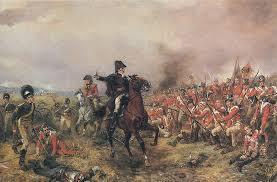 The Guards Remember Waterloo 1958
The Guards Remember Waterloo 1958
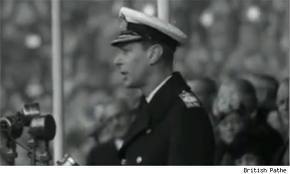 The Real King's Speech 1938
The Real King's Speech 1938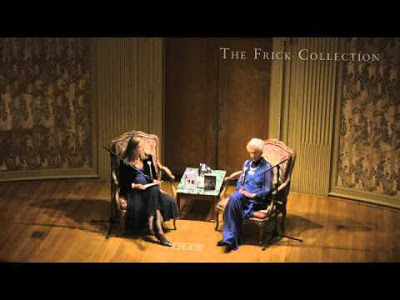
Charlotte Mosley's hour long interview with Deborah, Duchess of Devonshire for the Frick Collection
Published on September 04, 2013 00:30
September 2, 2013
The Adventures of Dr. Syntax in Search of the Picturesque, Part 12
Excerpts from Cantos XXIV, XXV, XVI , in which Dr. Syntax returns home at last
At the beginning of Canto 24, the author William Combe employs a favorite technique: commentary on the quality of popular culture in his day. Though the central thrust of Dr. Syntax is a satire on the idea of the picturesque as promoted in the works of William Gilpin and others, through Syntax, Combe has plenty to say about other aspects of his world:
Excerpts from Canto 24.
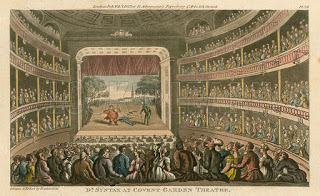 Dr, Syntax at Covent Garden Theatre
Dr, Syntax at Covent Garden Theatre
…"I’ve seen a play," he (Syntax) mutt'ring said; —
"Twas Shakespeare's — but in masquerade! I’ve seen a farce, I scarce know what 'Twas only fit to be forgot. I’ve seen a critic, and have heard The string of nonsense he preferred.Heaven bless me! where has Learning fled?Where has she hid her sacred head? Oh, how degraded is she grown, To spawn such boobies on the town!"...
"Well,” said my Lord, when he appear'd, “I hope the play your spirits cheerd; Falstaff, the morning critics tell, Was never surely play'd so well” "These critics," Syntax smiling said, “Are wretched bunglers at their trade; One sat beside me in the pit. No more a critic than a wit!...
They engage in a long discussion of the theatre and critics until they get back to the subject of Dr. Syntax’s book. Anyone familiar with publishing will enjoy the remarks of the publisher Vellum:
Vellum appeared, with solemn look. To talk about the Doctor's book. He said, “Twas true, a learned friend The manuscript did much commend; He thinks it is a work of merit. Written with learning, taste, and spirit; The sketches too, if he don't err. Possess appropriate character; 'Tis to the humour of our age. And has your Lordship's patronage; I therefore wish the work to buy. And deal with liberality. 'Tis true that paper's very dear, And workmen's wages most severe:The volume's heavy, and demands Th' engraver's with the printer's hands; Besides, there is a risk to run; Before the press its work has done. New taxes may, perhaps, be laid On some prime article of trade. And then the price will be so high; — The persons are but few who buy Books of so very costly kind; But still the work is to my mind: I’ll try my luck, and will be bound To give, my Lord, three hundred pound."
"After some little chat on trade.The bargain was completely made — The work transferr'd, the money paid.
"Tho'," said my Lord, “I think your gains By no means equal to your pains: (For Vellum will a bargain drive As well as any man alive;) The work must give my friend a name, And stamp his literary fame; 'Twill Paternoster Row command, And keep old Vellum cap-in-hand; And when a name is up, ‘tis saidThe owner may lay snug in bed. - Write on — the learned track pursue — And booksellers shall cringe to you."
"Much pass'd upon his Lordship's part, Which shew'd the goodness of his heart;: While Syntax made his full replies, Not with his tongue — but with his eyes.
Dr. Syntax will indeed be a published author! Music to his ears.
Selections from Canto 25
My Lord retir'd--the Doctor too,
As he had nothing else to do, Thought he would take a peep and see His noble Patron's library. So down he sat, without a care, In a well-stuff'd morocco chair. And seiz'd a book; but Morpheus shed The poppies o'er his rev'rend head; While Fancy would not be behind. So play'd her tricks within his mind. And furnish'd a most busy dream, Which Syntax made his pleasant theme. .
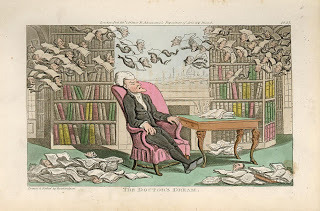 The Doctor's Dream When he awakes, he tells My Lord about the dream…
The Doctor's Dream When he awakes, he tells My Lord about the dream…
My Lord continued the debate; And time pass'd on in pleasant prate. Till night broke up the tete-a-tete.
Selections from Canto 26 CROWN'D with success, the following day The Doctor homeward took his way; And on the 'morrow he again Was borne by Grizzle o'er the plain; …
Some days before, (I had forgot To say,) a letter had been wrote. To tell how soon he should appear. And re-embrace his dearest dear; But not one solitary word Of his good fortune he preferred.
So when he arrives at home, his wife is hardly glad to see him, thinking him a failure.
'Twas thus he thought, when, at the gate. He saw his Doll impatient wait; Nor, as he pass'd the street along. Was he unnotic'd by the throng; For not a head within a shop But did through door or window pop. He kiss'd his dame, and gravely spoke. As now he brooded o'er a joke While she to know, impatient bum'd, With how much money he retum'd. " Give me my pipe," he said, " and ale, And in due time you’ll hear the tale." He sat him down his pipe to smoke,Look'd sad, and not a word he spoke; But Madam soon her speech began. And in discordant tones it ran: —
"I think, by that confounded look. You have not writ your boasted book; Yes, all your money you have spent, And come back poorer than you went; Yes, you have wander'd far from home. And here a beggar you are come…
Thus, as she vehemently prated, And the delighted Doctor rated. From a small pocket in his coat, He unobserv'd drew forth a note, And throwing it upon the table. He said, "My dear, you'll now be able To keep your mantua-maker quiet; So cease, I beg, this idle riot: And, if you'll not make such a pother, I'll treat you with its very brother: Be kind — and I'll not think it much To shew you half-a-dozen such."
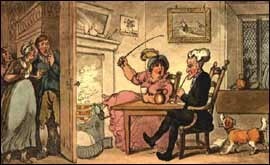 Doctor Syntax Returned From His Tour
Doctor Syntax Returned From His Tour
She started up in joy's alarms. And clasp'd the Doctor in her arms; Then ran to bid the boys huzisa, And gave them all a holiday.
"Such is the matrimonial life,"Said Syntax ; — "but I love my wife.Just now with horsewhip I was bother'd; And now with hugging I am smother'd; But wheresoe’er I’m doom'd to roam, I still shall say—that home is home…
Dr. Syntax reflects on life in general…
More had he spoke: but, lo! the Dame With the appointed haslet came: When Syntax, having bless'd the meat, Sat down to the luxuriant treat. "And now," he said, "my dear, 'twill be As good as Burgundy to me. If you will tell me what has pass'dSince we embrac'd each other last' “ Oh," she replied, " my dearest love, Things in their usual order move….
After a long litany of troubles his wife endured, the Doctor finishes his dinner. The Doctor thought his jolly wife Ne'er look'd so handsome in her life. Her voice he thought grown wond'rous sweet; To him a most uncommon treat…
Though to each virtue often blind, The world to wealth is ever kind ; For lo ! a certain tell-tale dame, Yclep'd and known as Mistress Fame, Had told to all the country round. That Syntax, for a thousand pound. Had sold a learned book he wrote; That now he was a man of note. …
But all these views soon found an end: A packet came, and from a friend, From 'Squire Worthy, who resides On Keswick's bold and woody sides. …
" Good Rev'rend Sir, Our Vicar's dead.And I have nam'd you in his stead. I often wish'd his neck he'd break. Or tumble drunk into the Lake... "You will perceive I keep my word, And to this church you're now preferred… You, Sir, may make the living clear Above three hundred pounds a year; And if you will but condescend To my Son's learning to attend; If you'll direct his studious hour, I'll add some fifty pounds or more:
Nay, soon we hope that you will cheerThe parish with your presence hereMiss Worthy and her sister join Their kindest compliments to mine; And to your prayers I recommend Your faithful and admiring friend, Jonathan Worthy."
...The time soon came, when, quite light-hearted. The Doctor and his spouse departed:And as they journey'd on their way. …
When rising 'mid the tufted trees. Syntax his sacred structure sees. Whose tow’r appeared in ancient pride. With the warm vic'rage by its side. “ At length, dear wife," he said, " we're come To our appointed tranquil home."
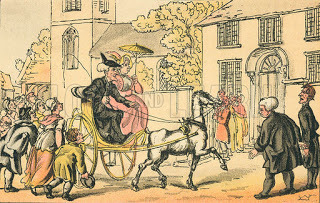 Doctor Syntax Taking Possession of His Living ...Syntax, whom all desir'd to please, Enjoy'd his hours of learned ease;Nor did he fail to preach and pray, To brighter worlds to point the way;While his dear spouse was never seen To shew ill-nature or the spleen; And faithful Grizzle now no moreOr drew a chaise, or rider bore. Thus the good Parson, Horse, and Wife, Led a most comfortable life. The End Note that the Horse is mentioned before the Wife in the conclusion...author William Combe always went for the rhyme!!!.
Doctor Syntax Taking Possession of His Living ...Syntax, whom all desir'd to please, Enjoy'd his hours of learned ease;Nor did he fail to preach and pray, To brighter worlds to point the way;While his dear spouse was never seen To shew ill-nature or the spleen; And faithful Grizzle now no moreOr drew a chaise, or rider bore. Thus the good Parson, Horse, and Wife, Led a most comfortable life. The End Note that the Horse is mentioned before the Wife in the conclusion...author William Combe always went for the rhyme!!!.
At the beginning of Canto 24, the author William Combe employs a favorite technique: commentary on the quality of popular culture in his day. Though the central thrust of Dr. Syntax is a satire on the idea of the picturesque as promoted in the works of William Gilpin and others, through Syntax, Combe has plenty to say about other aspects of his world:
Excerpts from Canto 24.
 Dr, Syntax at Covent Garden Theatre
Dr, Syntax at Covent Garden Theatre…"I’ve seen a play," he (Syntax) mutt'ring said; —
"Twas Shakespeare's — but in masquerade! I’ve seen a farce, I scarce know what 'Twas only fit to be forgot. I’ve seen a critic, and have heard The string of nonsense he preferred.Heaven bless me! where has Learning fled?Where has she hid her sacred head? Oh, how degraded is she grown, To spawn such boobies on the town!"...
"Well,” said my Lord, when he appear'd, “I hope the play your spirits cheerd; Falstaff, the morning critics tell, Was never surely play'd so well” "These critics," Syntax smiling said, “Are wretched bunglers at their trade; One sat beside me in the pit. No more a critic than a wit!...
They engage in a long discussion of the theatre and critics until they get back to the subject of Dr. Syntax’s book. Anyone familiar with publishing will enjoy the remarks of the publisher Vellum:
Vellum appeared, with solemn look. To talk about the Doctor's book. He said, “Twas true, a learned friend The manuscript did much commend; He thinks it is a work of merit. Written with learning, taste, and spirit; The sketches too, if he don't err. Possess appropriate character; 'Tis to the humour of our age. And has your Lordship's patronage; I therefore wish the work to buy. And deal with liberality. 'Tis true that paper's very dear, And workmen's wages most severe:The volume's heavy, and demands Th' engraver's with the printer's hands; Besides, there is a risk to run; Before the press its work has done. New taxes may, perhaps, be laid On some prime article of trade. And then the price will be so high; — The persons are but few who buy Books of so very costly kind; But still the work is to my mind: I’ll try my luck, and will be bound To give, my Lord, three hundred pound."
"After some little chat on trade.The bargain was completely made — The work transferr'd, the money paid.
"Tho'," said my Lord, “I think your gains By no means equal to your pains: (For Vellum will a bargain drive As well as any man alive;) The work must give my friend a name, And stamp his literary fame; 'Twill Paternoster Row command, And keep old Vellum cap-in-hand; And when a name is up, ‘tis saidThe owner may lay snug in bed. - Write on — the learned track pursue — And booksellers shall cringe to you."
"Much pass'd upon his Lordship's part, Which shew'd the goodness of his heart;: While Syntax made his full replies, Not with his tongue — but with his eyes.
Dr. Syntax will indeed be a published author! Music to his ears.
Selections from Canto 25
My Lord retir'd--the Doctor too,
As he had nothing else to do, Thought he would take a peep and see His noble Patron's library. So down he sat, without a care, In a well-stuff'd morocco chair. And seiz'd a book; but Morpheus shed The poppies o'er his rev'rend head; While Fancy would not be behind. So play'd her tricks within his mind. And furnish'd a most busy dream, Which Syntax made his pleasant theme. .
 The Doctor's Dream When he awakes, he tells My Lord about the dream…
The Doctor's Dream When he awakes, he tells My Lord about the dream…My Lord continued the debate; And time pass'd on in pleasant prate. Till night broke up the tete-a-tete.
Selections from Canto 26 CROWN'D with success, the following day The Doctor homeward took his way; And on the 'morrow he again Was borne by Grizzle o'er the plain; …
Some days before, (I had forgot To say,) a letter had been wrote. To tell how soon he should appear. And re-embrace his dearest dear; But not one solitary word Of his good fortune he preferred.
So when he arrives at home, his wife is hardly glad to see him, thinking him a failure.
'Twas thus he thought, when, at the gate. He saw his Doll impatient wait; Nor, as he pass'd the street along. Was he unnotic'd by the throng; For not a head within a shop But did through door or window pop. He kiss'd his dame, and gravely spoke. As now he brooded o'er a joke While she to know, impatient bum'd, With how much money he retum'd. " Give me my pipe," he said, " and ale, And in due time you’ll hear the tale." He sat him down his pipe to smoke,Look'd sad, and not a word he spoke; But Madam soon her speech began. And in discordant tones it ran: —
"I think, by that confounded look. You have not writ your boasted book; Yes, all your money you have spent, And come back poorer than you went; Yes, you have wander'd far from home. And here a beggar you are come…
Thus, as she vehemently prated, And the delighted Doctor rated. From a small pocket in his coat, He unobserv'd drew forth a note, And throwing it upon the table. He said, "My dear, you'll now be able To keep your mantua-maker quiet; So cease, I beg, this idle riot: And, if you'll not make such a pother, I'll treat you with its very brother: Be kind — and I'll not think it much To shew you half-a-dozen such."
 Doctor Syntax Returned From His Tour
Doctor Syntax Returned From His Tour She started up in joy's alarms. And clasp'd the Doctor in her arms; Then ran to bid the boys huzisa, And gave them all a holiday.
"Such is the matrimonial life,"Said Syntax ; — "but I love my wife.Just now with horsewhip I was bother'd; And now with hugging I am smother'd; But wheresoe’er I’m doom'd to roam, I still shall say—that home is home…
Dr. Syntax reflects on life in general…
More had he spoke: but, lo! the Dame With the appointed haslet came: When Syntax, having bless'd the meat, Sat down to the luxuriant treat. "And now," he said, "my dear, 'twill be As good as Burgundy to me. If you will tell me what has pass'dSince we embrac'd each other last' “ Oh," she replied, " my dearest love, Things in their usual order move….
After a long litany of troubles his wife endured, the Doctor finishes his dinner. The Doctor thought his jolly wife Ne'er look'd so handsome in her life. Her voice he thought grown wond'rous sweet; To him a most uncommon treat…
Though to each virtue often blind, The world to wealth is ever kind ; For lo ! a certain tell-tale dame, Yclep'd and known as Mistress Fame, Had told to all the country round. That Syntax, for a thousand pound. Had sold a learned book he wrote; That now he was a man of note. …
But all these views soon found an end: A packet came, and from a friend, From 'Squire Worthy, who resides On Keswick's bold and woody sides. …
" Good Rev'rend Sir, Our Vicar's dead.And I have nam'd you in his stead. I often wish'd his neck he'd break. Or tumble drunk into the Lake... "You will perceive I keep my word, And to this church you're now preferred… You, Sir, may make the living clear Above three hundred pounds a year; And if you will but condescend To my Son's learning to attend; If you'll direct his studious hour, I'll add some fifty pounds or more:
Nay, soon we hope that you will cheerThe parish with your presence hereMiss Worthy and her sister join Their kindest compliments to mine; And to your prayers I recommend Your faithful and admiring friend, Jonathan Worthy."
...The time soon came, when, quite light-hearted. The Doctor and his spouse departed:And as they journey'd on their way. …
When rising 'mid the tufted trees. Syntax his sacred structure sees. Whose tow’r appeared in ancient pride. With the warm vic'rage by its side. “ At length, dear wife," he said, " we're come To our appointed tranquil home."
 Doctor Syntax Taking Possession of His Living ...Syntax, whom all desir'd to please, Enjoy'd his hours of learned ease;Nor did he fail to preach and pray, To brighter worlds to point the way;While his dear spouse was never seen To shew ill-nature or the spleen; And faithful Grizzle now no moreOr drew a chaise, or rider bore. Thus the good Parson, Horse, and Wife, Led a most comfortable life. The End Note that the Horse is mentioned before the Wife in the conclusion...author William Combe always went for the rhyme!!!.
Doctor Syntax Taking Possession of His Living ...Syntax, whom all desir'd to please, Enjoy'd his hours of learned ease;Nor did he fail to preach and pray, To brighter worlds to point the way;While his dear spouse was never seen To shew ill-nature or the spleen; And faithful Grizzle now no moreOr drew a chaise, or rider bore. Thus the good Parson, Horse, and Wife, Led a most comfortable life. The End Note that the Horse is mentioned before the Wife in the conclusion...author William Combe always went for the rhyme!!!.
Published on September 02, 2013 00:30
August 30, 2013
Victoria's Day One in London, Part Two
As you might recall, in Part One, Ed and I were standing on Horse Guards Parade, watching a ceremony of mounted riders. Instead of the familiar Red Coats, they were wearing black uniforms, which shocked me. What was the story? Ed was probably thinking more about his sore foot, with its burst blisters and pain with every step.
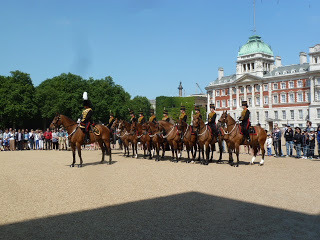 Horse Guards Parade, in the background: the Old Admiralty Building
Horse Guards Parade, in the background: the Old Admiralty Building
And behind us was the museum, with the hope of a seat where Ed could rest his aching foot.
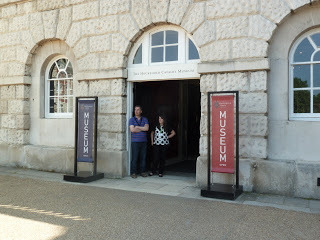 Museum Entrance We entered and paid our admission -- and miraculously there were benches, several of them. One problem solved. Now what about those uniforms? The Guide explained that every summer the Household Cavalry has time away from Horse Guards for maneuvers; their duties are taken over by the King's Troop Royal Horse Artillery, usually stationed at Woolrich. For more information, click here.
Museum Entrance We entered and paid our admission -- and miraculously there were benches, several of them. One problem solved. Now what about those uniforms? The Guide explained that every summer the Household Cavalry has time away from Horse Guards for maneuvers; their duties are taken over by the King's Troop Royal Horse Artillery, usually stationed at Woolrich. For more information, click here.
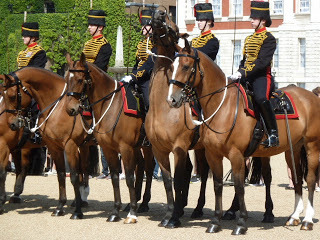 King's Troop Royal Horse Artillery As you might be able to see in the above view, some members of the KTRHA are female. That was a bit of a surprise, though a nice one. This unit is responsible for all the artillery salutes in the park. Click here for an account of the salutes to the new baby Prince George of Cambridge.
King's Troop Royal Horse Artillery As you might be able to see in the above view, some members of the KTRHA are female. That was a bit of a surprise, though a nice one. This unit is responsible for all the artillery salutes in the park. Click here for an account of the salutes to the new baby Prince George of Cambridge.
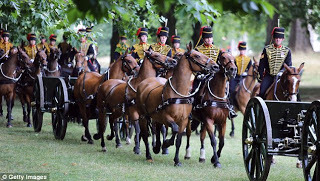 In Green Park, ©Getty Images So, the mystery of the uniforms was solved; I later found out that the King's Troop Royal Horse Artillery uniforms are almost identical to those worn by their predecessor unit in the Battle of Waterloo.
In Green Park, ©Getty Images So, the mystery of the uniforms was solved; I later found out that the King's Troop Royal Horse Artillery uniforms are almost identical to those worn by their predecessor unit in the Battle of Waterloo.
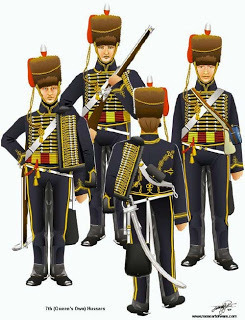 7th (King's Own) Hussars, Waterloo Uniform
7th (King's Own) Hussars, Waterloo Uniform
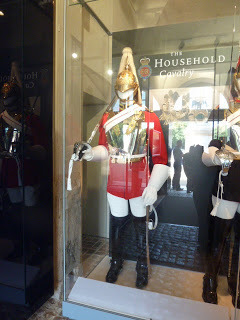 The more familiar Redcoat uniform We found Ed several seats placed conveniently around the museum. Unlike Kristine and me, our hubbies (would you believe I actually wrote hobbies there?) do not necessarily read every word of every text panel in a museum like this.
The more familiar Redcoat uniform We found Ed several seats placed conveniently around the museum. Unlike Kristine and me, our hubbies (would you believe I actually wrote hobbies there?) do not necessarily read every word of every text panel in a museum like this.
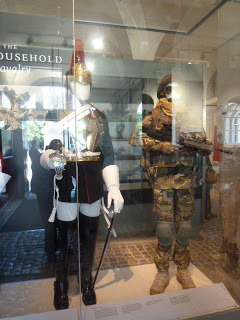 As you can see above (sorry for the reflections, but it was a bright and sunny day, a delight for London), the Household Cavalry wears various uniforms, including the kind of desert camouflage needed in Afghanistan.
As you can see above (sorry for the reflections, but it was a bright and sunny day, a delight for London), the Household Cavalry wears various uniforms, including the kind of desert camouflage needed in Afghanistan.
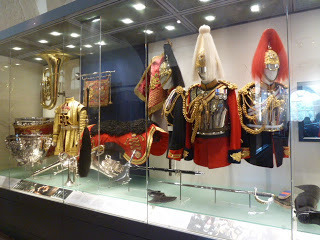 Second in command of the British troops during the Battle of Waterloo was Henry Paget, Earl of Uxbridge (1768-1854) who led the cavalry. In a famous incident at the very end of the battle, Paget and Wellington were side by side on horseback watching the action. A cannon shot hit Paget in the leg. He is reported to have said, "By God, sir, I've lost my leg," to which the Duke responded, "By God, sir, so you have." Thus, the epitome of sang froid.
Second in command of the British troops during the Battle of Waterloo was Henry Paget, Earl of Uxbridge (1768-1854) who led the cavalry. In a famous incident at the very end of the battle, Paget and Wellington were side by side on horseback watching the action. A cannon shot hit Paget in the leg. He is reported to have said, "By God, sir, I've lost my leg," to which the Duke responded, "By God, sir, so you have." Thus, the epitome of sang froid.
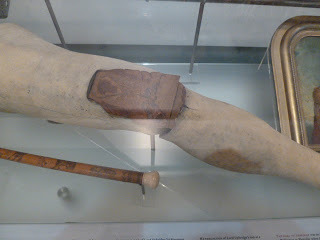 Paget's Artificial leg After the amputation of his leg, Paget recovered and led a long and illustrious career, his need for artificial limbs and his willingness to experiment leading to many advances in the science of prosthetics. Click here for the story of his actual limb and its bizarre fate as told by Kristine.
Paget's Artificial leg After the amputation of his leg, Paget recovered and led a long and illustrious career, his need for artificial limbs and his willingness to experiment leading to many advances in the science of prosthetics. Click here for the story of his actual limb and its bizarre fate as told by Kristine.
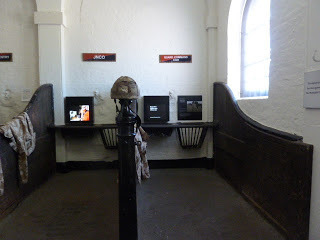 Examples of stalls for the horses For more information on the Household Cavalry Museum, click here.
Examples of stalls for the horses For more information on the Household Cavalry Museum, click here.
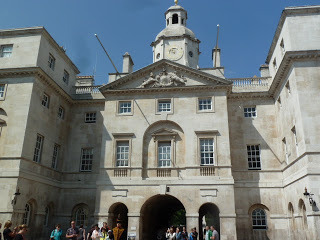 Horse Guards The Duke of Wellington for many years was the commander in chief of the British Army. As such his office was in Horse Guards, in the room directly above the arch.
Horse Guards The Duke of Wellington for many years was the commander in chief of the British Army. As such his office was in Horse Guards, in the room directly above the arch.
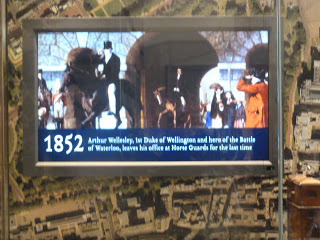 Museum display In the museum, a display tells the story of the Duke and his Armies, and shows a picture of him in leaving Horse Guards for the last time.
Museum display In the museum, a display tells the story of the Duke and his Armies, and shows a picture of him in leaving Horse Guards for the last time.
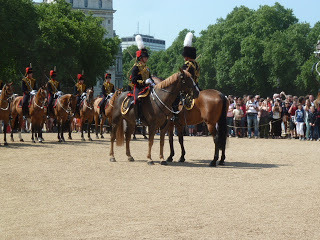 After Ed's foot was adequately rested and I had read every word of the descriptions and explored the small gift shop, we went back outside, where the original troops had been joined by a new set of horsemen and horsewomen. Their commanders seemed to be completing a changing of the guard. With a glance at the crowds of onlookers, Ed led the way back to Whitehall where we grabbed a taxi en route to our next stop, Mallett at 37 Dover Street in Mayfair. More about that in Part Three, coming soon.
After Ed's foot was adequately rested and I had read every word of the descriptions and explored the small gift shop, we went back outside, where the original troops had been joined by a new set of horsemen and horsewomen. Their commanders seemed to be completing a changing of the guard. With a glance at the crowds of onlookers, Ed led the way back to Whitehall where we grabbed a taxi en route to our next stop, Mallett at 37 Dover Street in Mayfair. More about that in Part Three, coming soon.
 Horse Guards Parade, in the background: the Old Admiralty Building
Horse Guards Parade, in the background: the Old Admiralty BuildingAnd behind us was the museum, with the hope of a seat where Ed could rest his aching foot.
 Museum Entrance We entered and paid our admission -- and miraculously there were benches, several of them. One problem solved. Now what about those uniforms? The Guide explained that every summer the Household Cavalry has time away from Horse Guards for maneuvers; their duties are taken over by the King's Troop Royal Horse Artillery, usually stationed at Woolrich. For more information, click here.
Museum Entrance We entered and paid our admission -- and miraculously there were benches, several of them. One problem solved. Now what about those uniforms? The Guide explained that every summer the Household Cavalry has time away from Horse Guards for maneuvers; their duties are taken over by the King's Troop Royal Horse Artillery, usually stationed at Woolrich. For more information, click here.
 King's Troop Royal Horse Artillery As you might be able to see in the above view, some members of the KTRHA are female. That was a bit of a surprise, though a nice one. This unit is responsible for all the artillery salutes in the park. Click here for an account of the salutes to the new baby Prince George of Cambridge.
King's Troop Royal Horse Artillery As you might be able to see in the above view, some members of the KTRHA are female. That was a bit of a surprise, though a nice one. This unit is responsible for all the artillery salutes in the park. Click here for an account of the salutes to the new baby Prince George of Cambridge.
 In Green Park, ©Getty Images So, the mystery of the uniforms was solved; I later found out that the King's Troop Royal Horse Artillery uniforms are almost identical to those worn by their predecessor unit in the Battle of Waterloo.
In Green Park, ©Getty Images So, the mystery of the uniforms was solved; I later found out that the King's Troop Royal Horse Artillery uniforms are almost identical to those worn by their predecessor unit in the Battle of Waterloo.
 7th (King's Own) Hussars, Waterloo Uniform
7th (King's Own) Hussars, Waterloo Uniform
 The more familiar Redcoat uniform We found Ed several seats placed conveniently around the museum. Unlike Kristine and me, our hubbies (would you believe I actually wrote hobbies there?) do not necessarily read every word of every text panel in a museum like this.
The more familiar Redcoat uniform We found Ed several seats placed conveniently around the museum. Unlike Kristine and me, our hubbies (would you believe I actually wrote hobbies there?) do not necessarily read every word of every text panel in a museum like this.
 As you can see above (sorry for the reflections, but it was a bright and sunny day, a delight for London), the Household Cavalry wears various uniforms, including the kind of desert camouflage needed in Afghanistan.
As you can see above (sorry for the reflections, but it was a bright and sunny day, a delight for London), the Household Cavalry wears various uniforms, including the kind of desert camouflage needed in Afghanistan. Second in command of the British troops during the Battle of Waterloo was Henry Paget, Earl of Uxbridge (1768-1854) who led the cavalry. In a famous incident at the very end of the battle, Paget and Wellington were side by side on horseback watching the action. A cannon shot hit Paget in the leg. He is reported to have said, "By God, sir, I've lost my leg," to which the Duke responded, "By God, sir, so you have." Thus, the epitome of sang froid.
Second in command of the British troops during the Battle of Waterloo was Henry Paget, Earl of Uxbridge (1768-1854) who led the cavalry. In a famous incident at the very end of the battle, Paget and Wellington were side by side on horseback watching the action. A cannon shot hit Paget in the leg. He is reported to have said, "By God, sir, I've lost my leg," to which the Duke responded, "By God, sir, so you have." Thus, the epitome of sang froid.
 Paget's Artificial leg After the amputation of his leg, Paget recovered and led a long and illustrious career, his need for artificial limbs and his willingness to experiment leading to many advances in the science of prosthetics. Click here for the story of his actual limb and its bizarre fate as told by Kristine.
Paget's Artificial leg After the amputation of his leg, Paget recovered and led a long and illustrious career, his need for artificial limbs and his willingness to experiment leading to many advances in the science of prosthetics. Click here for the story of his actual limb and its bizarre fate as told by Kristine.
 Examples of stalls for the horses For more information on the Household Cavalry Museum, click here.
Examples of stalls for the horses For more information on the Household Cavalry Museum, click here.
 Horse Guards The Duke of Wellington for many years was the commander in chief of the British Army. As such his office was in Horse Guards, in the room directly above the arch.
Horse Guards The Duke of Wellington for many years was the commander in chief of the British Army. As such his office was in Horse Guards, in the room directly above the arch.
 Museum display In the museum, a display tells the story of the Duke and his Armies, and shows a picture of him in leaving Horse Guards for the last time.
Museum display In the museum, a display tells the story of the Duke and his Armies, and shows a picture of him in leaving Horse Guards for the last time.
 After Ed's foot was adequately rested and I had read every word of the descriptions and explored the small gift shop, we went back outside, where the original troops had been joined by a new set of horsemen and horsewomen. Their commanders seemed to be completing a changing of the guard. With a glance at the crowds of onlookers, Ed led the way back to Whitehall where we grabbed a taxi en route to our next stop, Mallett at 37 Dover Street in Mayfair. More about that in Part Three, coming soon.
After Ed's foot was adequately rested and I had read every word of the descriptions and explored the small gift shop, we went back outside, where the original troops had been joined by a new set of horsemen and horsewomen. Their commanders seemed to be completing a changing of the guard. With a glance at the crowds of onlookers, Ed led the way back to Whitehall where we grabbed a taxi en route to our next stop, Mallett at 37 Dover Street in Mayfair. More about that in Part Three, coming soon.
Published on August 30, 2013 00:30
August 28, 2013
Shoe Help Needed
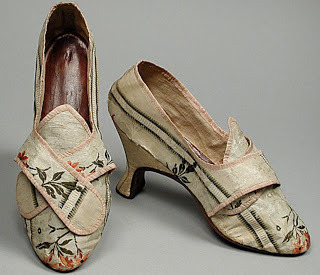
I have a question regarding shoemaking. Many contemporary diaries and letters refer to highborn ladies making shoes as a pastime during the early 19th century. It seems that even the Duchess of Wellington got into the act sometime later but I can find nothing more concrete than this passage from Alice Morse Earl's Two Centuries of Costume in America: "In Mrs. Gaskell's My Lady Ludlow we are told that my lady would not sanction the mode of the beginning of the century which "made all the fine ladies take to making shoes." Mrs. Blundell, in one of her novels, sets her heroine (about 1805) at shoe-making. The shoes of that day were very thin of material, very simple of shape, were heelless, and in many cases closely approached a sandal. . . . I have seen several old letters which gave rules for shaping and directions for sewing party-shoes of thin light kid and silk. It is not probable that any heavy materials were ever made up by women at home."
I've seen another passage from a contemporary letter which relates how a group of women chipped in on the cost of hiring themselves a master in shoemaking to come to one of their houses in order to give the group lessons on the art. Does anyone have any more information about this unique occupation? Victoria seems to think that the ladies worked on the decorative uppers, rather than actually constructing a shoe, but we'd be grateful for any information or research leads you can provide.
Published on August 28, 2013 00:30
August 26, 2013
A Couple In England - The End
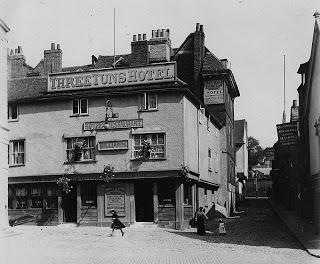
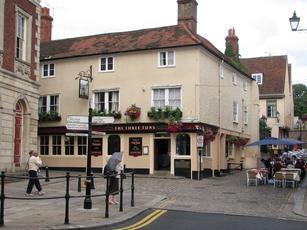
And so Hubby and I arrived at the end of our journey. We decided to have our last English meal at the Three Tuns, another of the historic pubs of Windsor that happens to be located directly behind the Guildhall. I wanted my last meal of bangers of mash. And enough rum to drown my sorrows.
"Are you sad about going home tomorrow?" Hubby asked once we were seated.
"I'm home now. I'm sad about going back to Florida."
"Most people in England would love to trade places with you," Hubby commented.
"Mad dogs and Englishmen," I replied.
"Huh?"
"Only mad dogs and Englishmen go out in the midday sun," I said, referring to our sub tropic Florida weather. Humid doesn't begin to cover it. I expect that Gunga Din and Wellington felt the same about India.
"The grass is always greener," Hubby went on.
"How droll. Actually, the grass does happen to be greener in England, where it isn't scorched by the blazing midday sun on a constant basis."
"Droll?"
I gave Hubby a scathing look and he dropped it. "What time do we leave tomorrow?" he asked instead.
Oh boy. Here we go. "About tomorrow . . . . "
Now it was Hubby's turn to glare. "C'mon, out with it."
I ordered another round from a passing waiter and forged ahead. "After we fly into Newark, we have a four hour layover before our three hour flight to Florida."
"What?"
"Ssshhhh! Don't get excited."
"Excited? Is that what you think I am? Excited? Because I'm telling you right now, excited I'm not. Why would you do that to me?"
"It was either that or wait till the next day to fly home."
"For Christ's sake, why didn't you wait till the next day?"
"I didn't know which option to choose and then I decided that you'd have blown a fuse no matter which way I went, so I opted for the layover. But it's okay because Brooke is going to come to the airport to pick us up. We'll all go out to eat, then we'll go back to her house for a while and then she'll bring us back to the airport. So we won't be stuck at the terminal for four hours."
This mollified him a bit. A very little bit.
"Listen, the next time you plan a trip to England for us, do it in the summer, will ya? And don't include London on the itinerary. London is too crazy for me. I liked Bath and I like Windsor. Think small. And when you come over here to look for houses, you're coming by yourself. I'm not traipsing all over England looking at houses. Understand?"
I kept my counsel, wisely deciding that now was not the time to tell Hubby that when a man was tired of London, he was tired of life.
"Alright, then, I'll just bring Vicky with me."
"And that's another thing," Hubby went on. "Don't think I haven't noticed that Ed and I don't figure in the plans that you and Vicky have for living in England. I'm just hoping you two plan on letting us die natural deaths first."
"Ideally you and Ed would be dead, granted, but I've got everything planned out in case you're still alive when I move here."
"Oh, brother. Go on. I can't wait to hear this."
"When we move to England, you're going to raise chickens."
"What?"
"I'll take care of the sheep and you'll raise chickens."
"Are you nuts? Why would I raise chickens?"
"So that you can barter the eggs, of course. Just think about it, you'll put on your tweed coat and make your way out every day to collect the eggs. Then you'll take your basket and you'll toddle your way down to the pub and trade your eggs for pints of beer. `Here are six fresh eggs in exchange for a pint of your best, my good man.' I can hear you now."
"It's the twenty-first century. No one barters any more."
"They do in England."
"You're nuts. You do realize that, don't you? Explain to me why I wouldn't just get in the car, drive to the pub and pay money for a pint of beer. You know, the way normal people do."
"See, this is why you don't figure into my plans for living in England. If I asked Vicky to collect the eggs and trade them in at the pub, she'd do it without an argument."
"Because she's as nuts as you are, that's why. You'll be known as the two crazy American women."
"Widows."
"Huh?"
"We'll be known as the two crazy American widows."
"Listen, all joking aside, dead or alive, I am not raising chickens. Got it?"
Our dinners arrived and we ate silently for a while. Then I asked, "Did you enjoy anything at all about the trip?"
Hubby looked at me. "Sure. Sure I did, Hon. I enjoyed all the parts that weren't London, that didn't involve walking, or rain or being sick."
As near as I could figure, that left the plane ride over. And Burger and Lobster. And Café Nero.
"I wish you loved England as much as I do."
"I don't have to love England. I love you and that's all that matters."
I smiled at him as we joined hands across the table. "Next time, I promise we'll go somewhere warm."
"It doesn't matter, as long as we're together."
"You mean that?"
"I do, my good man. Now tell me what in the Hell you think you know about raising sheep."
THE END
Published on August 26, 2013 00:00
Kristine Hughes's Blog
- Kristine Hughes's profile
- 6 followers
Kristine Hughes isn't a Goodreads Author
(yet),
but they
do have a blog,
so here are some recent posts imported from
their feed.



